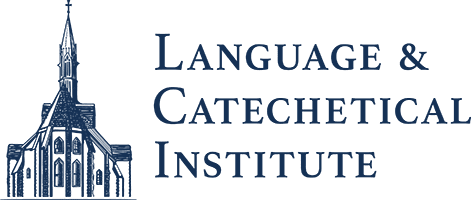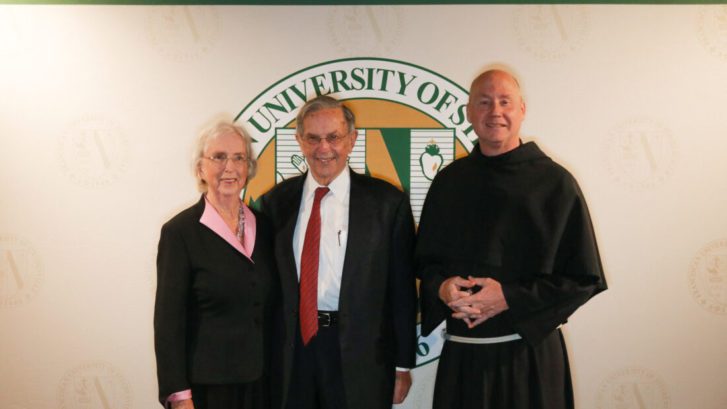On December 10, 2022, Francisan University honored Nick Healy with the Founders Award for his work in establishing the program in Gaming, Austria. (including LCI). The following is an excerpt from his acceptance speech.
I confess I used to think of myself as the founder of the Austrian program but I heard a remarkable talk a few years ago that changed my perspective. It was given by a man who many considered the most successful lawyer for religious liberty cases; a man with a near 90% win record, including several notable US Supreme Court decisions. He said “People credit me with all these victories. They were not my victories; they were God’s. God does not need me to win cases but he let’s me help Him.” That is an aspect of God’s love for us. He lets us mortal and frail human beings help Him even though he does not need the help. The speaker asked us to think about the boy with 5 loaves and 2 fish when Jesus fed the 5,000. Imagine when that boy went home and his mother asks him “Samuel, did you have a good day?” Samuel answered “Yes mom” we fed 5,000 people. Well Jesus did most of the work, but He let me help Him!”
When it comes to Gaming, I am that boy. It was September of 1989. Jane and I had gone to Rome with Dr. von Hildebrand. We had an audience with St. John Paul II. Jane asked the Pope to pray for FUS and he nodded his consent. The next day we were in Liechtenstein at the International Academy of Philosophy to meet our daughter Katie and son-in-law Jules, who were studying graduate philosophy there. Our plan was drive them to Holland, where Jules’ parents were to host a reception for the newly married couple. They asked if we could give a ride to Dr. Joseph Seifert, the founder of the IAP and a leading scholar of the work of the late Dietrich von Hildebrand. We agreed. It was a ten hour drive. I doubt many people have ever had ten hours with Dr Seifert. He spent most of that time in lamentation. For years he said he had been struggling to achieve accreditation from Austria, which would then make accreditation easier in other European countries. He had finally achieved it. And he had also been offered a magnificent campus in Austria, his native country, at a former Carthusian monastery in a little village west of Vienna called Gaming: the Kartause Maria Thron. He described the deep associations with the founding of the Habsburg dynasty, how it became the spiritual home of the first Habsburgs to live in Austria; the successful defense against the Turkish invaders, the closing of the monastery (one of 900 closed) by Emperor Joseph II; its desecration by the Soviet army toward the end of World War II and finally its miraculous resurrection by a German architect, Walter Hildebrand, who was eager to give over its use to a Catholic institution such as the IAP. However, Seifert had just been informed by the Austrian Government that if he moved the IAP to Austria they would cancel its accreditation. This he could not risk so he had to tell Hildebrand that the IAP would remain in Lichtenstein: he then added “Nick, perhaps your university would be interested in the Kartause Gaming? Only years of playing poker kept me from shouting “YES”, and I simply conveyed that it was possible, so perhaps he should call Hildebrand and see if he would even consider an American institution. This was before all cell phones, so at the next stop for gas he called from a pay phone. Hildebrand said he would be willing to meet with representatives of an American university.
Jane and I were planning on a long weekend in Bruges, Belgium before returning home to Steubenville but by now the Kartause Gaming was such an intriguing prospect that we quickly changed plans. Immediately after the reception in Holland we
drove 14 hours east to Austria, met Walter and took a lengthy tour of the Kartause. While much of it was still a ruin, the transcendent beauty of the restored sections and the deep romance of its storied history convinced us that it was surely a gift from God. We said we would like to pursue the possibility of use of the Kartause by FUS. Hildebrand said he needed to call high level friends in Rome to learn if FUS was really what it claimed to be: a faithfully Catholic university. The call was made and Hildebrand confirmed to us that FUS was indeed what it claimed to be.
Yet once back in Steubenville I could not imagine how such a wild idea could be accepted. Programs in Rome were common; but Italy was a NATO country and no Soviet troops were on its border. Austria had committed to neutrality as a condition for the withdrawal of Soviet troops in the 1950’s and was not a NATO country. The “Iron Curtain” was still firmly in place in neighboring Hungary and Czechoslovakia. Less than 100 miles from Gaming the borders were marked by towers containing machine guns.
Again God intervened. Two days after our return I was asked to accompany Fr. Mike and John Green, the Executive VP, on a trip to Columbus for a meeting of the heads of private colleges and universities in Ohio collaborating on certain fundraising. On the 2-1/2 hour drive to Columbus I think I took 2 hours to describe the whole story of the Kartause Gaming, its history, its connection to the Holy Roman Empire, its architecture and ongoing work of renovation. At the end I simply posed the question: should I take the next step? I was afraid of, but expected, a response such as “Let’s take it up at our next Executive Council meeting” or “Let’s refer it to the faculty for study” or “Let’s ask a committee of Trustees to consider it”. But he simply answered with a firm “Yes”. And of course John Green, who controlled the University’s budget, a man of unmatched prudence and fiscal caution, heard him. No chance for this insane idea to be throttled at birth! Less than three months later we returned to Gaming. In those three months the Berlin Wall was demolished. Czechoslovakia and Hungary removed their machine gun towers and announced their borders were open and Americans were now welcome to enter without a visa. An era was ending and a new one beginning. Negotiations with Hildebrand for a lease of part of the Kartause for FUS could and did begin.
Of course having a suitable facility was only part of the need. Who could be trusted with establishing and running a study abroad program 4000 miles from Steubenville? God had also arranged this. The then Academic Dean, Michael Healy, already knew Seifert and the IAP and of their plan to move to Gaming. He also knew Jim Fougerousse, who for years had run the Rome program of the University of Dallas. He had since become the IAP’s de facto head of operations and had planned the move to Gaming. Already himself entranced by the Kartause, fluent in German and an admirer of Austrian culture, he was the perfect choice to head a the new “study abroad” program of FUS. He happily took the offer of a job. Another critical connection was not public. Walter Hildebrand’s English was not particularly good and he could be quite difficult to deal with. But his wife Primrose was Irish and she and Jane became fast friends, which greatly facilitated Walter and I through some rough spots over our pronged negotiations.
One of the first add-ons to the academic program was the result of Walter’s plea that we help the “East People”, by which he meant the persecuted Catholics of the former Soviet Bloc countries, many of whom had been denied university education because of their faith. Just in time Madeleine Rivest, the Canadian sister-in-law of an FUS board member was retiring from years of work teaching English to those of different languages and she volunteered to head up a new language program in Gaming. Once we added a Catechetics element it was supported by the USCCB.
I asked a young auxiliary bishop of Vienna, Most Rev. Christoff Schoenborn, to be the spiritual advisor to what was now the LCI and he agreed, beginning a decades long collaboration with Franciscan’s Gaming program. Madeleine Rivest brought in two assistants. Bobette Huzovic and Jennifer Healy, who devoted 30 years to the “East People”, including scores of bishops, and which has profoundly helped and influenced the Church in Eastern Europe
Fr. Mike’s “Yes” led to still other unplanned blessings. For example: through contacts made in Gaming I was introduced to Piet Dirksen, the Dutch mega philanthropist and told him about FUS. He then provided provided the first six scholarships for LCI students. He also selected FUS to play a leading role in a major project of youth evangelization, leading to the hiring of Marcus Grodi.
Another significant blessing was Cardinal Schoenborn asking FUS to help the Austrian Bishops respond to Saint John Paul II’s request to take over a Pontifical Institute in Holland which became the ITI, (International Theological Institute) originally based in Gaming; and Fr Werenfried Van Stratton, Founder of Aid to the Church in Need, personally committing to a gift of $200,000 to launch the ITI; and many others too numerous to mention.
So my dear friends and colleagues, I gratefully accept this honor while acknowledging it belongs to God. This is a time of crisis in our nation and in the Church. Let us all pray that we rightly discern the Father’s purposes and that He lets us help Him achieve them. I have no doubt he has prepared FUS to help in a major way!

